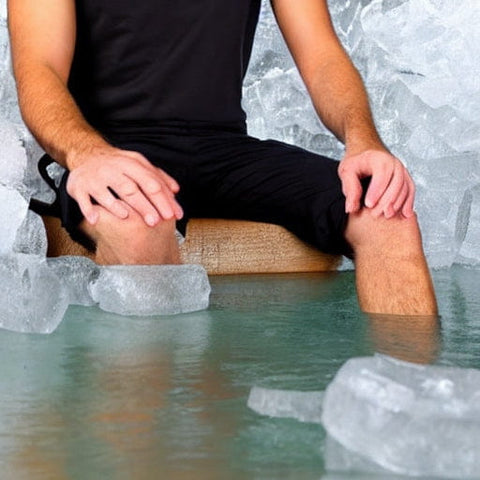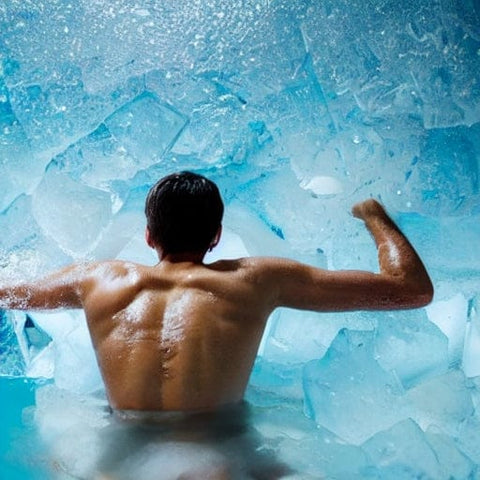Benefits of Taking an Ice Bath
There is a wide variety of health improvements that may result from taking an ice bath, including a rise in the number of white blood cells and a decrease in inflammation. They have also been shown to improve a person's capacity to recover after sustaining a CWI.
Advantages of taking an ice bath are:
- Reducing muscle soreness: Especially after strenuous activity or an accident, immersing oneself in cold water for a period of time might assist to alleviate muscular pain and inflammation.
- Improving recovery time: Ice baths have been shown to be effective in lowering muscular inflammation and swelling, which may assist to shorten the amount of time needed for recovery.
- Improving circulation: Increased blood flow to the muscles and an improvement in circulation may be achieved by immersing oneself in cold water, which causes the blood vessels to contract. This in turn helps to enhance blood flow to the muscles.
- Reducing fatigue: The use of cold water immersion has been shown to help relieve tiredness in certain people by lowering levels of muscular soreness and inflammation.
Boost the numbers of white blood cells
During the colder months, taking a bath in ice water may provide a range of health advantages. A dip in cold water may make you feel better in every way, from improving the health of your heart to improving the function of your immune system. In point of fact, a research that was published not too long ago in the Journal of Medical Sciences discovered that swimmers who spent a few minutes swimming in a cold pool were more likely to have a raised white blood cell count. Swimming in cold water drives fluid through the lymph nodes, which in turn promotes a stronger immune system response. This has been ascribed to the fact that swimming in cold water forces fluid through the lymph nodes.
The greatest thing is that you don't have to be a professional athlete or spend a lot of time on the court in order to enjoy the benefits of playing tennis. Just a short trip to the spa in your neighborhood should do the job. And if you use only a little of your imagination, you may reap the same rewards without having to break a sweat. Ice baths accelerate the body's natural healing process, which contributes to its effectiveness as a rehabilitation tool. One of the many positive effects that living a pampered life may have on one's health is an increase in the amount of blood that flows through their veins, which is especially helpful for those who have immune systems that are already weak.

In particular, cold treatment is beneficial in preventing inflammation after an accident or surgical procedure. The usage of ice helps your body cleanse itself while also lowering inflammation, which is a double benefit. Those who suffer from persistent health issues, such as arthritis or cancer, may benefit from taking an ice bath every day. Additionally, it is a good method to decompress, which is particularly important if you work full-time and have a lot of stress in your life. You should try a whirlpool or an ice bath if you are interested in finding a new activity or if you just want to boost your general health.
Get rid of the irritation
The use of an ice bath may result in a reduction in muscular pain, an improvement in circulation, and an increase in flexibility. After a strenuous exercise, this can cut down on the length of time you need to recuperate.
However, there are some reservations about the health advantages of ice baths. There have been instances of individuals experiencing things like muscular spasms, for instance. Additionally, if you have a pre-existing ailment such as heart disease, you should see your healthcare physician prior to attempting to use it.
Aside from alleviating pain, taking an ice bath may also help you relax and give your mood a boost. In the same way that regular exercise like walking may enhance one's general health, some study suggests that ice baths may also have a beneficial influence on the cardiovascular system.
An additional application for ice baths is as a treatment for anxiety and stress-related conditions. According to a research that was conducted at Texas A&M University, drinking cold water might cause an increase in the body's metabolic rate. Additionally, it improves the body's capacity to control the lymphatic system.
Although there are some research that indicate ice baths have a beneficial impact on inflammation, the majority of investigations have revealed that these advantages are not nearly as powerful as they are purported to be. Ice baths are used by a wide variety of people, both athletes and others who aren't involved in sports, to relax and soothe painful muscles.
Make sure that your skin is dry and that you are wearing protective gear before utilizing an ice bath. If you have skin that is easily irritated, you should take things gently and simply wash the bottom part of your body at first.

Utilizing a thermometer is highly recommended as the method of choice for accurately estimating the degree of frigidity required for your ice bath. You want the temperature of the water to be anywhere between 50 and 59 degrees Fahrenheit.
Ice baths are not for everyone, but they may be beneficial for those who love being physically active. Ice baths are not for everyone. In addition, they provide pain relief after a particularly strenuous activity.
Enhance recuperation after a CWI
Many athletes employ a technique called cold water immersion (CWI), which stands for cold water immersion. The use of cold water is thought to alleviate muscular pain, postpone the development of delayed onset muscle soreness, and lessen the inflammatory response in the body. Additionally, immersion in cold water has been shown to boost both performance and recuperation after exercise.
CWI has been investigated for the oxidative and vascular changes that occur in response to exercise. It is unclear, however, whether or not this enhances endurance performance. More study is required to evaluate whether or not it truly works, despite the fact that certain studies have claimed that it boosts power production.
The growth of mouse mitochondria has been found to be improved by frequent exposure to cold water, according to a number of studies. Another research found that cyclists who participated in CWI had enhanced endurance performance. On the other hand, there are some research which demonstrate that CWI does not have a favorable impact on strength increases following resistance exercise. A placebo effect could be to blame for these results.

A literature review that was conducted in 2011 by Broatch and colleagues looked at the mechanics of CWI as well as the function that rehabilitation plays in restoring muscle and strength. They came to the conclusion that CWI may alleviate muscle pain, boost neuromuscular function, and cut down on inflammatory reactions.
Although CWI does seem to improve strength, it has been shown to have a detrimental impact on muscle hypertrophy. It has been shown to disrupt anabolic signaling and prevent testosterone synthesis in the body. When taken on a consistent basis, CWI may inhibit the physiological mechanisms that are responsible for strength growth. The good news is that in addition to these healing procedures, there are others that may be used to reduce the severity of these effects.
Use of CWI should be approached with extreme care, particularly after strenuous training or competition. There is no evidence that it does so in a physiological sense; nevertheless, some studies have indicated that it does promote subjective recovery. The long-term consequences of CWI have not yet been discovered, and further study is required to understand whether or not it has any beneficial implications in terms of molecular signaling.
Boost the body's natural defenses and immunity
There are a lot of advantages to taking a cold shower or an ice bath. Taking cool showers or baths may not only assist avoid heat-related injuries but also speed up the healing process. There is evidence from a few different studies that being exposed to cold may boost your immune response. A cold shower may have a similar effect, lifting your mood and making it easier to fall asleep. Nevertheless, it is essential to make certain that your body is not subjected to temperatures that are too high or too low. If you have certain medical concerns, for example, you may want to steer clear of taking a shower with cold water.
The results of a more in-depth research, on the other hand, reveal that taking a cold shower may really assist strengthen your immune system. Increased blood flow to the arms and legs, which raises your white blood cell count, was determined to be the cause of this impact. In addition to this, drinking a little bit of cold water every day may help prevent infections of the upper respiratory tract.
The capacity of a cold shower or ice bath to drop your pulse rate more quickly than passive recovery is the most noticeable advantage of using these recovery methods. In addition, the increased circulation of blood that contains oxygen helps speed up the recovery process of your muscles after exercise.

However, it is essential to keep in mind that a cold bath or shower does not always have to be excruciating for the recipient. Unwinding in this manner may be a lot of pleasure. Additionally, there is some evidence to suggest that those who swim often in cold water have a higher resistance to sickness.
One of the most significant advantages of taking an ice bath is that it may help boost your brain's performance. In the long term, regular practice of meditation, which is a relaxing exercise, may strengthen your immune system. In addition, taking a relaxing bath might enhance your mood by causing your endorphin levels to rise. Getting a soothing massage might also help you sleep better at night.
You won't be able to enjoy the advantages of an ice bath or cold shower on a daily basis, but you can still do them when you have the chance.
Is it possible to get hypothermia by submerging oneself in ice water?
Hypothermia is a potentially life-threatening condition that may arise from prolonged exposure to low temperatures. This ailment is more dangerous than frostbite, because it impairs a person's ability to think clearly and move about normally.
If you take a few common sense steps, you can avoid becoming hypothermia. You may do this in a number of ways, one of which is to avoid being still in the water for an extended amount of time. You could try an ice bath instead, but break it up into many shorter periods.
If you've never tried ice bathing before, ease into it. You should start with your feet and then go up to the rest of your body. It is important to keep in mind that the bathtub may not be large enough to accommodate your full body. Put on a warm shirt as well as a pair of socks if you want to keep your body warm.
In addition to lowering the risk of developing hypothermia, taking an ice bath regularly may also assist in reducing edema. The water will remove heat from your body 25 times more quickly than air would do so.
Consult your primary care physician before beginning your ice bath. People who suffer from cardiovascular disease, diabetes, or peripheral neuropathy should exercise extra caution. Even those who may not have these specific health problems might still need to exercise caution.

Utilizing a thermometer to verify that the temperature is accurate is another crucial step in reaching the desired outcome. It is recommended that you start your ice bath at a temperature that is between 50 and 59 degrees Fahrenheit.
When you initially go into an ice bath, you should immediately begin to take several deep breaths. This will assist you in avoiding the risk of drowning.
If you start to feel lightheaded, get out of the ice bath. Additionally, use extreme caution when you exit the ice bath. Be sure to thoroughly dry your hands as soon as you go outside.
After you have finished your ice bath, you should also have a hot beverage. Consuming a warm beverage will help you relax and can also alleviate the symptoms of your cold.

























































Leave a comment